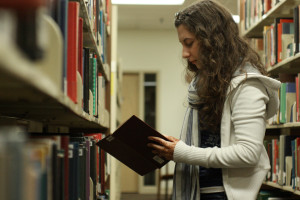
By Kaye Burnet | The Duquesne Duke
A study released by the Pew Research Center revealed that today’s college students read more than any other age group in the United States.
According to the study, 88 percent of all young adults in the United States ages 18-24 have read at least part of a book, essay or article in the last year. The 2,986 member study showed that, while the college-age group read frequently for school or work, they were significantly less likely to have read a book for pleasure.
A poll of a Duquesne freshmen Honors Inquiry class supported this finding. Out of a 15 member class, every student testified to reading at least one book for school in the last two months, while only three could recall reading for pleasure in that time.
Chris Cornett was one of the freshmen that did find time to enjoy more than his assigned books.
“I read about three hours every day, mostly fantasy,” Cornett said. “The last book I read was downloaded onto my laptop.”
Duquesne University sophomores Ben Unpingco and Brian D’Orazio said they do not have the time to read for fun. D’Orazio said he started reading a book for pleasure a few weeks ago, but “with all the stuff I’ve had to do, it’s been hard to get past the first 100 pages.”
Unpingco also said his time to read for fun is limited.
“I’d say about 80 percent of the reading I do is for school,” Unpingco said. “I haven’t read a whole book purely for enjoyment since July.”
Reading for pleasure does not have to be limited to fiction, according to the Pew Research Center. It can include news articles, magazines and anything else that is not assigned for work or school.
Duquesne University offers several programs to allow students access to such reading materials. The College Readership Program provides free daily newspapers to students and faculty, according to Student Government Association vice president of academic affairs Zachary Hudak.
The subscriptions available are the New York Times, USA Today and Pittsburgh Post-Gazette. They are distributed to stands in the residence halls, the law school and the Student Union, Hudak said.
Sophomore finance major Michael Rand occasionally picks up a copy of the New York Times, but says the Readership Program could expand.
“I really wish they had the Wall Street Journal,” Rand said. “There is an entire business school that could benefit.”
Another resource for non-academic reading is the McNaughten Popular Book Collection, according to Gumberg Library resource sharing librarian John Euliano. The collection is located at the entrance to the library, directly across from the front desk.
Popular bestselling fiction and nonfiction is cycled through periodically, so students can always have access to new releases.
“It’s a great way for an otherwise academic library to provide some fun reading,” Euliano said.
However, Duquesne students may be on their own when it comes to enjoying popular literature. Euliano was not aware of any school-sponsored popular book club or discussion group currently in existence on campus.
“I think we may have independent groups of students getting together to discuss books, but I don’t know of any club sponsored by the library,” Euliano said. “It might be a good idea, though. Anything that would bring more people into the library is something I would be in favor of.”
When asked if he would be interested in joining a book club at Duquesne, Cornett responded, “I would definitely consider it. ”




